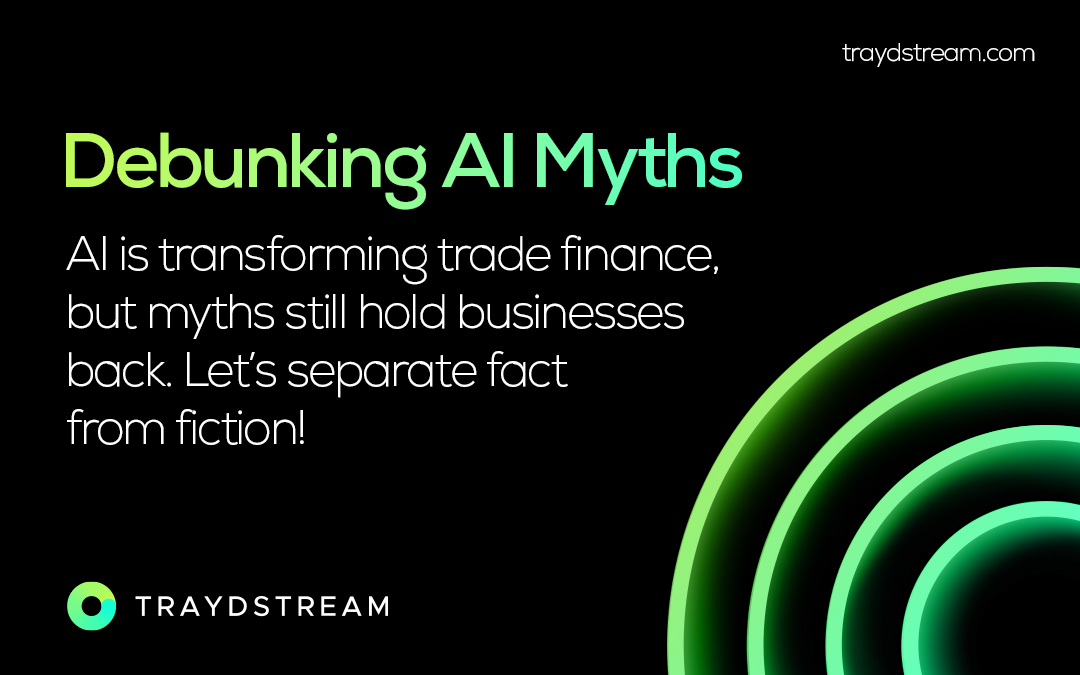
The rise of Artificial Intelligence (AI) has transformed industries across the globe, and trade finance is no exception. While AI presents incredible opportunities for efficiency and innovation, there are still several misconceptions that hold businesses back from fully embracing this technology. Let’s debunk some of the most common myths about AI in trade finance and shed light on how it can truly benefit your organization.
Myth 1: AI Takes Years to Deliver ROI
One of the most persistent myths about AI is that it requires years of investment and implementation before businesses see a return on investment (ROI). While some AI projects can be complex and time-consuming, many modern AI solutions are designed to provide quick wins and tangible value in a matter of months. Whether it’s automating repetitive tasks, improving accuracy in document processing, or enhancing decision-making, AI can deliver measurable results rapidly. Companies that start with small, targeted implementations can begin to see ROI almost immediately, making AI a strategic investment for both the short and long term.
Myth 2: AI Cannot Adapt to Evolving Trade Regulations
Trade regulations are continuously evolving, and it’s a common belief that AI solutions can’t keep up with the changing landscape. In reality, AI systems can be designed to adapt quickly to new regulations. By leveraging machine learning and natural language processing, AI can monitor legal updates in real-time and adjust workflows accordingly. Rather than being a bottleneck, AI can actually enhance regulatory compliance by ensuring that all trade operations remain up-to-date with the latest rules.
Myth 3: AI Is Only for Large Global Banks
There’s a misconception that AI is only useful for large global banks with vast resources. While it’s true that large organizations were early adopters of AI in trade finance, this technology is becoming increasingly accessible to businesses of all sizes. AI solutions are now being tailored to suit the needs of mid-sized companies and smaller banks, offering scalable and affordable options. Whether you’re processing trade documents, assessing risk, or improving fraud detection, AI is no longer limited to the giants of the industry.
Myth 4: AI Replaces the Need for Human Oversight
Another common myth is that AI will eliminate the need for human oversight in trade finance. While AI can automate many processes, human expertise is still crucial for overseeing decision-making, handling exceptions, and managing complex situations. AI excels at enhancing human capabilities, not replacing them. By handling repetitive and time-consuming tasks, AI frees up trade professionals to focus on more strategic and high-level activities, improving both efficiency and job satisfaction.
Myth 5: AI Has Limited Support for Non-Standard Documents
Some believe AI is only effective when dealing with standard or templatized trade documents. However, advancements in natural language processing (NLP) and machine learning have significantly expanded AI’s capabilities. Today’s AI systems can effectively interpret and extract data from a wide variety of document types—including complex, non-standard documents such as contracts and customs declarations. This makes AI a highly versatile tool for navigating the full spectrum of trade finance documentation.
Myth 6: AI Solutions Are Difficult to Implement
Another misconception is that AI solutions are difficult to implement and require complex infrastructure changes. While early AI projects often required significant investments in time and resources, today’s solutions are much more user-friendly. Many AI platforms like TraydStream are cloud-based and can be integrated with existing systems quickly and with minimal disruption. With the right AI partner, organizations can deploy AI solutions without the need for overhauling their entire infrastructure, making the transition smoother and more cost-effective.
Myth 7: AI Will Slow Down Trade Operations Due to Complex Configuration
Finally, some believe that AI will actually slow down operations due to its complex configuration and setup. On the contrary, AI is designed to streamline processes, not hinder them. Modern AI systems are built to work seamlessly within existing workflows, automating tasks such as document verification, data extraction, and compliance checks. Rather than causing delays, AI accelerates trade operations by reducing manual effort and enhancing decision-making speed.
Conclusion: Embracing AI in Trade Finance
While there are many myths surrounding AI, the reality is that this technology is a game-changer for trade finance, offering the potential for faster, more efficient, and more compliant operations. By debunking these myths and understanding how AI can support your business, you can unlock its full potential and stay ahead of the competition.
AI isn’t the future—it’s the present. It’s time to stop believing the myths and start embracing the benefits AI can bring to your trade finance operations.
Still think AI can’t handle your trade documents? Traydstream is here to change your mind—reach out and see how we’re redefining what’s possible in trade finance



